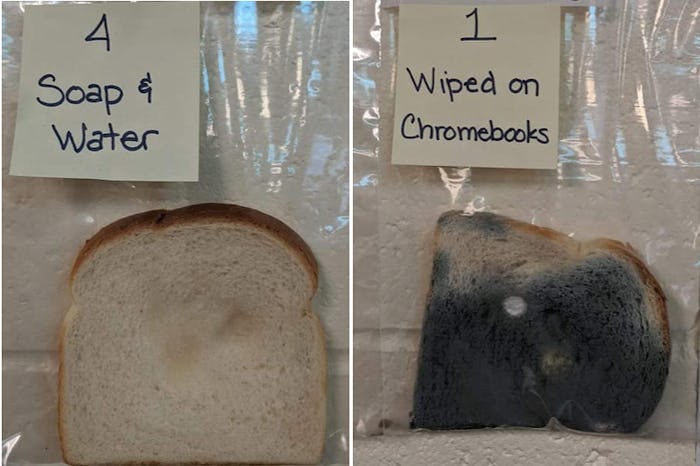How often do you wash your hands? It's a pretty personal question, but the reality is that it affects a whole lot of people around you, as evidenced by a classroom's moldy bread science experiment that's been making the rounds on social media. And once you see the results, you're going to want to head to the sink immediately.
Students at Discovery Elementary School in Idaho Falls, Idaho recently spent a month looking at how their unwashed hands would affect slices of bread. As part of the science experiment, their teacher Dayna Robertson and behavior specialist Jaralee Metcalf had all 17 students handle slices of bread from the same bag in several different ways.
"We did a science project in class this last month as flu season was starting," Metcalf shared in a viral Facebook post. "We took fresh bread and touched it. We did one slice untouched. One with unwashed hands. One with hand sanitizer. One with washed hands with warm water and soap. Then we decided to rub a piece on all our classroom Chromebooks."
The results were pretty shocking, perhaps especially the way the bread rubbed on Chromebooks changed over time.
Metcalf tells Romper that this particular science experiment was one they found on Mystery Science, a lesson planning website, and thought it would help the kids understand the importance of washing their hand. "Honestly there has been a lot of sickness," she says. "So many staff and students out. My family especially has been sick. My 8 month old son and my husband! And of course myself. So we wanted to show the kids how fast germs can spread and how detrimental hand washing is to our health."
Of course, hand washing is always important but it is especially vital during flu season and especially if you are working in a school where you come into contact with loads of different people all day. This year's flu season has been exceptionally difficult, with ABC News reporting that 1,300 people have died from flu-related illnesses already this year.
Metcalf tells Romper that the kids and adults were all surprised by the results. "Neither the children or adults expected the results!" she says. "They were shocking and enlightening! We have definitely upped our hygiene habits around the classroom!"
The U.S. Centers for Disease Control and Prevention (CDC) recommends washing your hands with warm water and soap frequently during the day for at least 20 seconds at a time. As this experiment shows, hand sanitizer is better than dirty hands but not as effective as washing your hands with soap and water.
"As somebody who is sick and tired of being sick and tired of being sick and tired. Wash your hands!" Metcalf wrote on Facebook. "Remind your kids to wash their hands! And hand sanitizer is not an alternative to washing hands!! At all!
It's a bit of a gross lesson, but it's absolutely necessary as flu season approaches.
